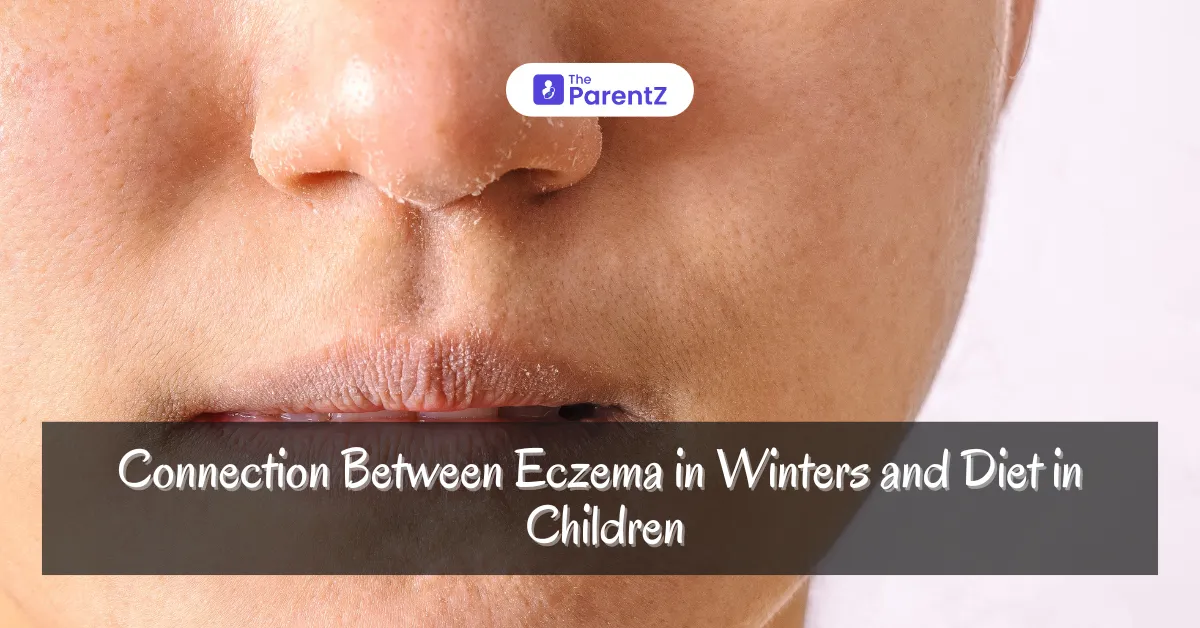Eczema in children often worsens during the winter months due to cold, dry air and decreased humidity. Interestingly, diet also plays a role in managing eczema symptoms. Understanding the connection between seasonal triggers and nutritional choices can help parents provide better care for their children.
Why Does Eczema Worsen in Winter?
• Dry Air and Low Humidity: Cold weather dries out the skin, weakening its natural barrier.
• Indoor Heating: Heaters reduce moisture in the air, leading to itchy and cracked skin.
• Clothing Irritants: Wool or synthetic fabrics used in winter clothing may irritate sensitive skin.
Role of Diet in Eczema During Winter
Diet affects skin health and can either soothe or aggravate eczema symptoms, especially in winter when the skin barrier is already compromised.
1. Foods That May Aggravate Eczema:
• Dairy Products: Milk and cheese can trigger inflammation in children sensitive to cow’s milk proteins.
• Processed Foods: High sugar and preservative content can increase skin inflammation.
• Eggs, Nuts, Soy, and Wheat: Common allergens that may cause eczema flare-ups in some children.
2. Foods That Benefit Skin Health:
• Omega-3 Fatty Acids (Fish, Flaxseeds, Walnuts): Reduce inflammation and improve skin hydration.
• Probiotic Foods (Yogurt, Fermented Foods): Strengthen gut health, which is linked to eczema management.
• Vitamin A-Rich Foods (Carrots, Sweet Potatoes): Promote skin repair and healing.
• Vitamin D Sources (Fortified Foods, Mushrooms): Boost immunity, especially during less sun exposure in winter.
3. Hydration:
• Dehydration worsens dry skin. Offer plenty of water, warm soups, and hydrating fruits like oranges and cucumbers.
Practical Tips to Manage Eczema in Winter Through Diet
1. Elimination Diet: Identify and avoid food triggers by eliminating suspected allergens under a doctor’s guidance.
2. Introduce Healthy Fats: Use olive oil or avocado in meals to boost skin barrier function.
3. Supplements: Consider omega-3 or probiotic supplements for added anti-inflammatory benefits.
4. Limit Sugary Treats: Avoid excess sugar, which is common during the holiday season.
Holistic Winter Eczema Care Tips
• Use a humidifier to maintain indoor air moisture.
• Apply thick emollients immediately after bathing to lock in moisture.
• Dress your child in soft, breathable fabrics (e.g., cotton) and layer clothing to avoid sweating.
Note for Parents
Winter eczema can be challenging, but combining proper skin care with a balanced, anti-inflammatory diet can significantly reduce symptoms. Monitor your child’s response to certain foods and seek professional advice if needed.
Explore related articles on the TPZ app:
• “Winter Skin Care Tips for Kids with Eczema.”
• “Dietary Triggers for Common Pediatric Skin Conditions.”








Be the first one to comment on this story.